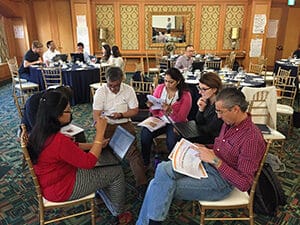7 February 2017.
Seoul – When clothing giant Gap Inc. looked to enhance work place relationships in supplier factories they turned to Better Work for advice. The company has been a Better Work Partner since the founding days of the programme, collaborating with factories in Cambodia, Haiti, Jordan, Vietnam, Indonesia and Bangladesh. Better Work and Gap Inc. jointly developed the Workplace Cooperation (WPC) Partnership launched in 2014 and continuing through this year and next.
“Better Work has long been aware of the human and financial dividends that come from improved communications and relationships between workers and management in garment factories. It’s one of the key elements in our approach,” explains Minna Maaskola, training and capacity building officer for Better Work.
“It is encouraging that a company like Gap Inc. has recognised this and is keen to learn from us and train its own people to take this knowledge into their factories. We also get to learn more about their approaches to doing business”, says Minna.
All Better Work factories are expected to develop a formal worker-management committee, usually known as a Performance Improvement Consultative Committee (PICC), but often it takes more than forming a committee to actually change the communications dynamic in factories.

Joo Jun, who leads capability building for Gap Inc. in North Asia, South East Asia and Americas, took part in WPC training in Seoul in November 2016. She found that solely relying on assessments against Gap Inc.’s Code of Vendor Conduct was not yielding the systemic change the company was looking for: “What we try to do as a brand is [implement] what we think is right, and it must make workers happy but after 10 or 15 years of seeking to improve working conditions, we recognize that we still face many of the same issues,” she explains.
The WPC approach “brings an open door communications channel between workers and management. With this model we are not just saying to factories you need to have a constructive relationship between managers and workers, we are actually equipping them with the tools to build that relationship,” Joo added.
The first phase of WPC training focuses on the Training of Trainers (ToT) for Gap Inc. staff on Better Work’s different Workplace Cooperation related training modules. These include effective PICCs, negotiation skills, the Better Work service model and facilitation skills.
“There’s a lot about facilitation skills,” says Reema Agrawal, who leads Gap Inc.’s capability building program for South Asia, “…improved industrial relations should obviously mean a reduction in disruptive things that happen, including strikes.” Agrawal was impressed by the way workers and managers applied themselves to the training, but sounded a realistic note on the potential:
“I don’t see that this will be the end of disputes but what will be more important for us is that if there are disputes, the two parties will be willing to engage with each other, talk to each other in a constructive way and that there are methods and ways to find resolution with that dispute,” she said.
Ultimately, the aim of the programme is to allow Gap Inc. to provide training on these skills beyond factories aligned with Better Work. To date, Gap Inc. has implemented training activities with 32 factories in 9 countries and are looking into expanding the work in 2017 into 35 more factories.
“Our strategy for the next five years is all about partnership and scaling up. We know the Better Work programme works, but there’s a limit to how many factories we can assess, advise and train. This kind of collaboration with Gap Inc. and other brands is a real opportunity to take the combined field experience of many years and spread it more widely,” said Conor Boyle, global operations manager for Better Work.
Phase two of the partnership is due to begin in July of 2017. This phase will introduce Gap Inc.’s Supplier Sustainability team to improving grievance mechanisms, the very successful Supervisory Skills Training as well as the development of Master Trainers within the Gap Inc. team.